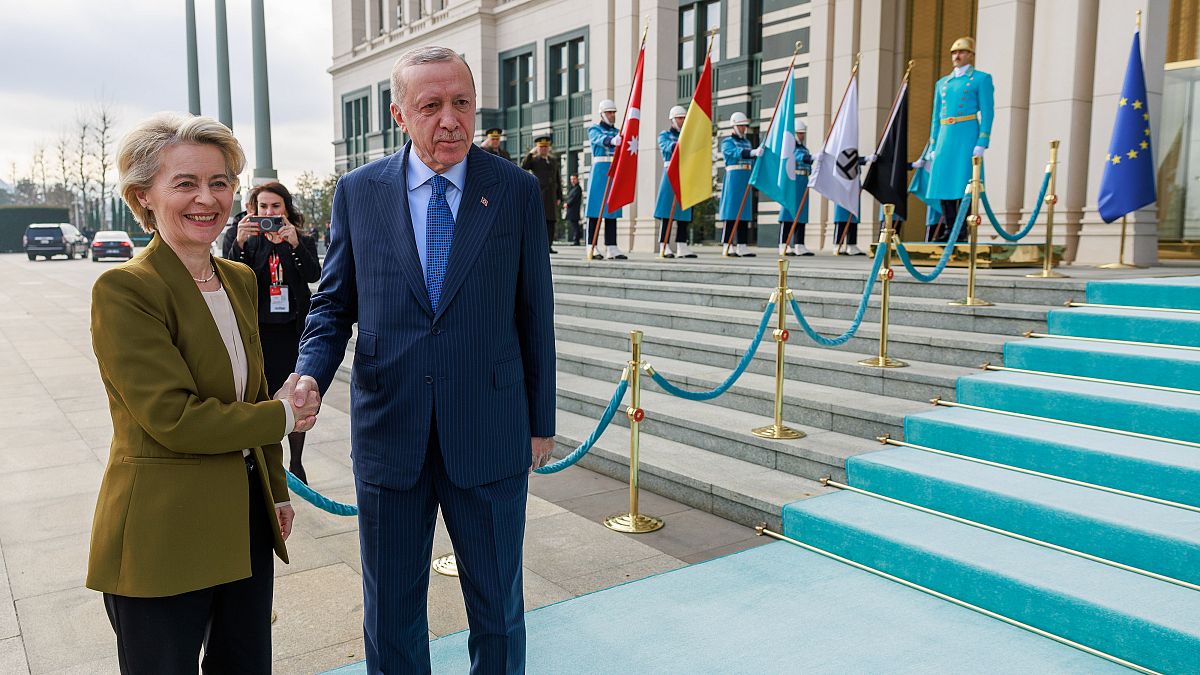Brussels wants to use Ankara’s influence to guarantee unity in Syria, as well as to avoid a new confrontation in the northern part of the country.
All roads leading to Syria pass through Ankara… Or so it has seemed ever since Turkey emerged as one of the biggest winners out of the downfall of Bashar al-Assad’s regime, having had a significant, indirect military presence in the country and supported the rebels who seized power.
This has given Ankara immediate access to Syria’s new leaders, and international recognition as a major player in the country’s affairs.
From US Secretary of State Antony Blinken to European Commission President Ursula Von Der Leyen, Western leaders are have been reaching out to Turkish President Recep Tayyip Erdogan to address the latest developments in Syria.
This begs the question – why is everybody turning to Turkey to discuss matters relating to Syria?
“There is no doubt that the Turkish president is a rather pragmatic political figure, and has dealings with all of the regional actors, including Vladimir Putin. Therefore, his true motives can be very difficult to decipher. On the other hand, from the perspective of the EU and President von der Leyen, what choice do you have?” says Jacob Funk Kirkegaard, senior fellow at Brussels-based think tank Bruegel.
“The reality is that today, Turkey is the main outside power broker inside Syria. And if you want to have any influence on events there, you must work through Turkey,” he adds.
On Monday, the EU instructed a senior diplomat to directly engage with the provisional government set up by Hayat Tahrir al-Sham (HTS) in Syria. However, Brussels also needs to use Ankara’s influence to facilitate a smooth transition that guarantees the country’s unity as well as respect for the rights of all minorities.
“Turkey is playing a big role right now in the middle of this crisis in Syria. There is a completely new situation there. The al-Assad regime is gone for good. However, there are many uncertainties regarding tolerance for the various components of Syrian society,” Marc Pierini, senior fellow at Carnegie Europe tells Euronews.
According to Pierini, Turkey is ready to play a major role while Ankara, like the Europeans, supports tolerance and territorial integrity.
“But in the case of Turkey, remember that they have lots of troops in the northern part of Syria. So we don’t yet know how this will unfold. And in Syria, we have the remnants of the Islamic State. So security there is very important,” he concludes.
The list of issues to be discussed by the EU Commission president and President Erdogan will be long. However, Brussels’ goals seem clear aside from EU-Turkey relations and EU funding for refugees.
“I would expect the President of the EU Commission to place emphasis on at least two main issues. The first one is to try to establish a genuine unity government in Damascus. Secondly, she will not want Turkey, and particularly the Turkish-aligned rebel militias inside Syria, to aggressively pursue military confrontation with Kurdish militias. That’s another way of saying she will want Turkey to help create a unified Syria and not start another civil war with Turkish military operations against Kurdish rebels inside Turkey, Iraq, and occasionally also inside Syria,” says Kirkegaard.
The EU’s stance when it comes to Turkey has always been cautious. Many diplomats describe President Erdogan as unpredictable, which causes insecurity in Brussels when dealing with the Turkish leader.
Although Turkey is a candidate country for accession into the EU, progress has been anything but positive. The European Council has noted that Turkey’s accession negotiations have effectively reached a standstill, and that no further chapters, which are necessary to proceed with the accession process, are being either opened or closed.
At the same time, Turkey has received financial assistance to host 3.5 million Syrian refugees, with the amount provided considered “not enough” by Ankara. Turkey now wants to send Syrian refugees back, but this would require stability in Syria as well as certain guarantees for the returnees.
Pierini points out some important issues on this: “Turkey wants most of the 3.5 million or so Syrians who have stayed the country for a long time to go back. The issue here is to go back to what you have first, the legal problem, which is that under the al-Assad regime, everybody who had fled Syria to take refuge in Turkey or in Europe or in the Gulf was considered a terrorist. So, there are major sanctions on the books. These laws will have to be repealed. Are they being repealed? Right now, we don’t know.”
Pierini believes the EU must ensure that refugees who return to their country, from wherever that may be, will have security in Syria.
“The second issue is infrastructure. Do they go back to their home or apartment block, assuming it is still standing? At least one-third of houses and apartments there have been destroyed. So, it may be a nice objective. People may be willing to go back, but it’s a much bigger issue if they don’t have a place to stay.”
As the EU now promises another one billion euros to support Syrian refugees in Turkey,** Pierini thinks the money could also be used to facilitate returns.
“I would expect the Turkish leadership to try and prolong the huge EU assistance they have received for Syrian refugees in their country by some form of assistance to help them return. It is a very complex issue, but I guess this will be part of the discussion.”
Read the full article here


